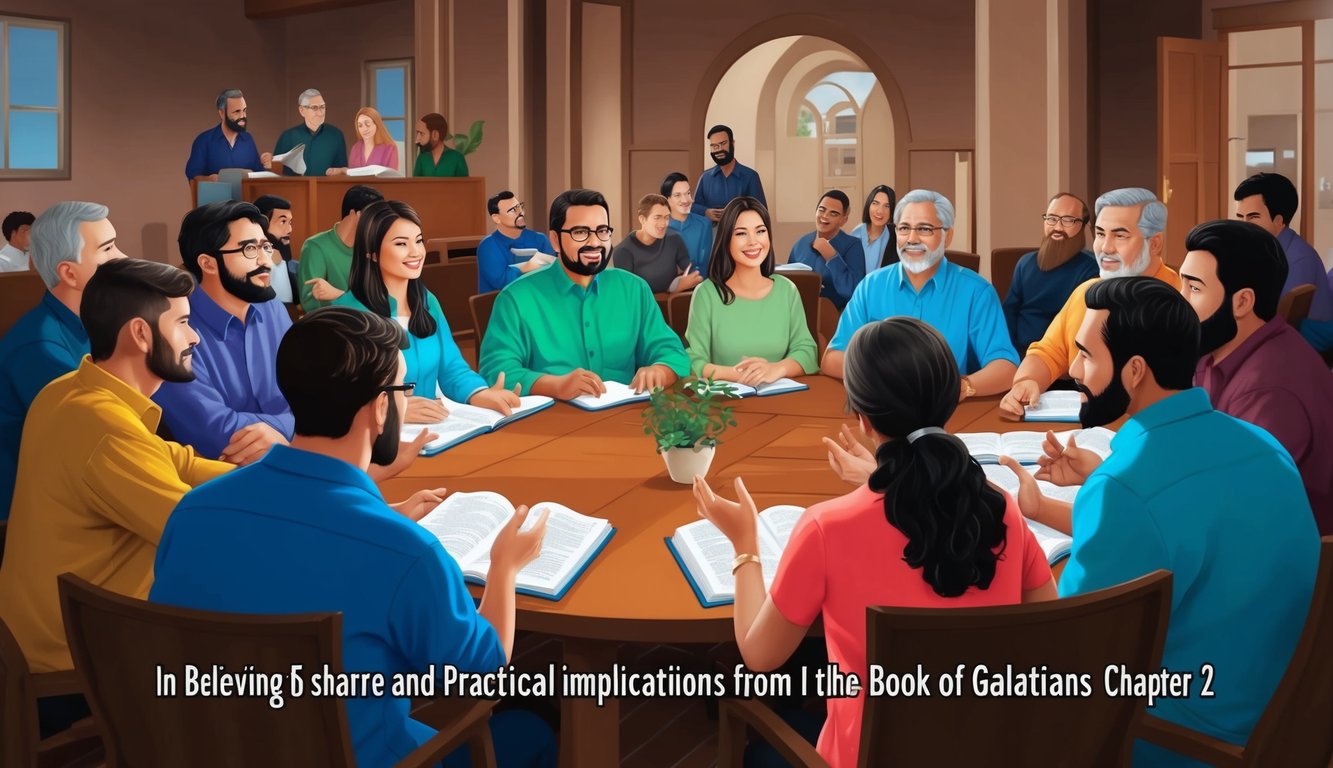Don’t Miss Out On This Unique Astrological Opportunity
Are you tired of spinning your wheels and getting nowhere? Simply put, you’re out of sync: you’re out of alignment with your astral configuration.
But: there’s a kind of map that can help you reclaim your alignment. Think of it as your own personal blueprint to success and happiness: a blueprint that will help you live your most amazing life.
Get started here.
Galatians 2 is a fascinating chapter that takes you straight into the heart of early Christian struggles and the determination to uphold the truth of the Gospel.
In this passage, Apostle Paul stands firm in his mission to spread the message of grace and faith, confronting even Peter when necessary.
This sets the stage for understanding the vital theme of justification by faith, rather than by works.
Paul’s boldness in Galatians 2 provides invaluable insights into the significant doctrinal issues faced by early Christians.
You are introduced to the debates over circumcision and the tension between Jewish customs and the new faith.
These early challenges remind you that faith rests in Christ alone and not in following the law.
Through this chapter, you see how Paul defends the Gospel truth, stressing the importance of unity and truth even when challenged by other leaders.
It’s a powerful reminder of the courage needed to stand up for your beliefs, a lesson that resonates as much today as it did centuries ago.
Key Takeaways
- Apostle Paul champions the Gospel truth in Galatians 2.
- Justification by faith challenges old customs.
- Paul’s courage inspires believers to defend their beliefs.
Historical Context and Key Figures
In Galatians 2, Paul recounts a significant trip to Jerusalem where he interacts with key figures like Peter and other apostles.
This chapter highlights the role of Titus and important debates about the gospel message and Gentile believers.
Paul’s Journey to Jerusalem
Paul’s trip to Jerusalem is rich with purpose.
He travels there about 14 years after his spiritual conversion, accompanied by Barnabas and Titus.
They go to meet with the pillars of the church to discuss his gospel message to the Gentiles.
Jerusalem, as a religious center, is where Paul seeks to confirm his teachings with other apostles.
He wants to ensure his work among the Gentiles is in harmony with the broader mission of the church.
This trip signifies Paul’s commitment to unity without compromising his calling.
Interaction with Peter and Other Apostles
Meeting key leaders like Peter, James, and John, Paul presents the message he preaches among the Gentiles.
These leaders are considered pillars of the early church and hold significant influence.
Paul seeks their endorsement to strengthen his ministry.
Your understanding of this meeting is crucial as it underscores the unity and shared mission among early Christian leaders.
While each apostle serves different communities, they all agree on one gospel.
The interaction also addresses tensions over traditions, particularly around the practice of circumcision.
The Role of Titus
Titus plays a unique role in this narrative.
As a Greek, he serves as a representative of the Gentile converts.
His presence in Jerusalem is a test case for the acceptance of Gentiles without the Jewish rite of circumcision.
Paul’s insistence on not circumcising Titus stands as a statement against imposing Jewish customs on non-Jewish Christians.
This stance highlights a key message of Galatians: faith in Christ, not legalistic rituals, is what binds believers together.
Titus thus embodies the freedom and inclusivity of the Christian faith.
Central Themes and Doctrinal Issues
In Galatians 2, several important doctrines are discussed, defining key aspects of the Christian faith.
These themes focus on how faith in Christ justifies believers, the grace and freedom found in Christianity, and confronting hypocrisy within the church.
Justification by Faith
You learn from Galatians 2 that justification comes through faith in Jesus, not by following the Law.
This is a vital doctrine explaining that righteousness is a gift from God through belief in Christ’s sacrifice.
It means you are made right with God not because of works or rituals but through trust in Jesus.
Paul underscores that adhering to the Jewish Law, like circumcision, doesn’t justify.
Being justified by faith assures you of God’s grace and not by being a Lawbreaker.
Christian Liberty and Grace
The grace of God frees you from the chains of the Law.
In Galatians 2, Christian liberty emphasizes how faith and grace allow you to live a life reflecting Christ, without bound by strict religious rules.
By embracing this liberty, you experience the true freedom and peace of being in Christ.
When you live under grace, you aren’t held captive by legalistic demands.
This transforms how you understand righteousness — not as something earned, but as a state given by God.
Confrontation of Hypocrisy
Paul confronts Peter when he acts hypocritically by avoiding Gentile believers.
This shows the importance of integrity in upholding the Gospel’s truth.
You see how hypocrisy can harm the church’s unity and witness.
Confronting such behavior is crucial for promoting genuine faith and community.
Addressing false believers and Judaizing influences ensures the purity of the Gospel message.
Maintaining a consistent life that aligns with faith in grace, rather than hypocrisy, reinforces the love and acceptance shared through the Gospel.
Practical Implications for Believers

Galatians 2 guides you on how to live with faith, focusing on unity, diversity, and the freedom that comes with knowing Christ.
This chapter helps you see how your life should reflect your beliefs and the grace of God.
Unity in Diversity
In Galatians 2, unity among believers, both Jews and Gentiles, is essential.
You’re encouraged to welcome diversity, fostering an environment where differences are celebrated.
This unity emerges when you recognize that all believers are saved through the grace of God, not by following the Law of Moses.
This unity challenges you to break down barriers in fellowship.
When diverse believers come together, they demonstrate the strength and beauty of the church’s true mission.
Equality is highlighted, encouraging peace and acceptance.
You can practice Christian charity by showing acceptance and understanding toward others, realizing everyone is part of God’s family.
This mindset helps to build a unified church, reflecting the true spirit of the gospel.
Living Out the Gospel
Living in the light of the gospel means trusting and showing the freedom in Christ.
Galatians 2 tells you to live not by the constraints of law, but by faith.
This isn’t a call to abandon conduct and responsibility but emphasizes living a new life transformed by faith.
You are new in Christ, away from the constraints of the law.
Real freedom allows you to act in love and serve others selflessly.
When living out the gospel, aim to align actions with beliefs.
Your life should reflect peace, embodying a changed heart and the new man in Christ.
This calls for consistently practicing love and compassion, promoting a genuine sense of community among believers.
Impact on Christian Thought

Galatians 2 holds significant influence in Christian theology.
It highlights crucial themes like justification by faith and the authority of Scripture, which have shaped both historical and modern Christian thought.
Influence on Reformation Thinkers
Galatians 2 was pivotal for Reformation leaders like Martin Luther.
You see, Luther strongly opposed the idea that one could earn salvation through works.
This chapter supported his belief in justification by faith alone.
Luther believed that by emphasizing faith over works, Christians would understand the free grace offered through Christ’s sacrifice.
The Apostle Paul’s defense of his apostleship and insistence on the truth of the Gospel lent authority to the Reformers’ rejection of church traditions that contradicted Scripture.
Contemporary Understanding of Pauline Theology
Today, Galatians 2 continues to impact how we interpret Paul’s teachings.
The chapter’s emphasis on faith and grace still influences contemporary debates over Christian doctrine.
You can see its lasting effect in how Christians understand their dependence on Christ.
Paul’s insistence that faith in Jesus, not adherence to laws, is what justifies us shapes much of modern Pauline theology.
The message of free grace and unity under Christ remains a cornerstone of many Christian communities, portraying it as transformative rather than legalistic.
Frequently Asked Questions

In Galatians 2, Paul addresses several key themes like justification by faith, disagreements among early Christian leaders, and the role of the Law.
This chapter is important for understanding how early Christians grappled with their identity and practices.
What does Paul address in his letter to the Galatians in chapter 2?
Paul talks about his journey to Jerusalem with Barnabas and Titus.
He presents the gospel message he has been preaching and discusses the issue of whether Gentile Christians should follow Jewish laws, like circumcision.
How is the concept of justification by faith presented in Galatians 2?
Paul emphasizes that people are justified by faith in Jesus Christ, not by works of the law.
He argues that faith, rather than adherence to the law, is what brings salvation and righteousness.
What is the significance of the confrontation between Paul and Peter in Galatians 2?
Paul confronts Peter for behaving hypocritically in Antioch.
Peter’s actions of avoiding Gentile Christians, influenced by Jewish Christians, contradict the gospel’s message of unity and equality.
This highlights early church tensions about cultural practices and faith.
Can you describe the role of the Law in the lives of Christians as taught in Galatians 2?
Paul teaches that while the Law has its place, it doesn’t justify believers.
The Law serves to highlight sin but doesn’t provide the means for salvation, which comes through faith in Christ.
What does it mean to be ‘crucified with Christ’ as mentioned in Galatians 2:20?
Being ‘crucified with Christ’ means that believers identify with Jesus in his death and resurrection.
In faith, their old sinful selves die, and they live a new life through Christ, who empowers them.
How does Galatians 2 contribute to the overall message of the epistle?
This chapter reinforces the core message of Galatians, which is freedom from the Law through faith in Christ.
It addresses issues of identity, community, and the transformative power of the gospel.
Paul emphasizes that true freedom in Christ leads to a life guided by the Spirit rather than the desires of the flesh.
This transformation is evident in the believer’s character, as seen in Galatians 5:22 meaning—which highlights the fruit of the Spirit, such as love, joy, and peace.
By living according to the Spirit, Christians reflect the values of God’s kingdom and build a community rooted in grace and faith.



